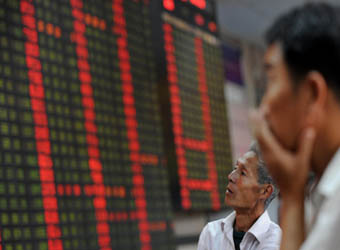Asia stock markets traded mixed Monday, with traders focused on the wobbling dollar and the upcoming two-day policy meeting from the Federal Reserve later in the week.
In Australia, the ASX 200 dropped 34.74 points, or 0.61 percent, to 5,688.10, with most sectors finishing lower.
The heavily-weighted financials subindex closed down 0.77 percent as major banking stocks remained under pressure throughout the trading day. Shares of ANZ closed down 0.73 percent, Commonwealth Bank fell 0.48 percent, Westpac was lower by 0.77 percent and the National Australia Bank slid 1.02 percent.
Japan’s benchmark Nikkei 225 pared some of its losses to close down 124.08 points, or 0.62 percent, at 19,975.67, while the Topix index closed down 8.42 points, or 0.52 percent, at 1,621.57. Across the Korea Strait, the Kospi retraced early losses to close nearly flat at 2,451.53.
On the Chinese mainland, the Shanghai composite bucked the downward trend to close up 12.5 points, or 0.39 percent, at 3,250.49. The Shenzhen composite reversed early losses to tack on 8.85 points, or 0.48 percent, to 1,854.66. In Hong Kong, the Hang Seng index traded up 0.45 percent in late afternoon trade.
In the currency market, the dollar index, which measures the greenback against a basket of currencies, traded at 93.925 at 3:28 p.m. HK/SIN, climbing from an earlier session low of 93.823. Reuters reported that was the lowest level since June 2016. The dollar index had seen levels above 95.00 last week.
Increasing political uncertainty from the White House contributed to another bout of dollar weakness, analysts said Monday, following on a rough close last week for the greenback.
Last week, a shakeup in the White House saw press secretary Sean Spicer abruptly resign after opposing President Donald Trump’s appointment of Anthony Scaramucci as communications director. The musical chairs within the administration are likely to add to the perception of a wobbly White House subject to infighting.
“Spicer’s resignation on Friday was the latest political event to perpetuate the notion of disarray within team Trump,” Ray Attrill, head of foreign-exchange strategy at the National Australia Bank, told CNBC. That came “on top of last Thursday’s news that special counsel (Robert) Mueller’s investigations were broadening to include prior Trump business dealings,” he said.
Mueller, a former FBI director, was named by the Justice Department in May to lead an investigation into Russian interference in last year’s U.S. elections. Reports also suggested Trump is considering terminating Mueller and that the president was looking into the extent of his authority to issue pardons to aides, family members — and even himself.
Trump’s son-in-law and White House advisor, Jared Kushner, will also be interviewed this week by the Senate Intelligence Committee in a closed session.
Attrill added that the dollar index is still about “2 percent above the critical technical level of around 92.00, below which the risk is for accelerated moves to the downside.” He added the currency is now trading at least 5 percent cheap relative to key fundamental drivers, such as interest rates and risk sentiment.
Analysts also attributed the dollar weakness to a more resilient euro.
“There has been very little backpedaling on the long euro storyline as dealers continue to place much emphasis on [ECB President Mario] Draghi declining the opportunity to talk down the currency post ECB minutes,” said Stephen Innes, head of trading for Asia Pacific at OANDA, in a note.
The euro traded at $1.1647 on Monday afternoon Asia time, retreating from an earlier high of $1.1684. Elsewhere, the Japanese yen traded at 110.77 to the dollar, strengthening from an earlier low of 111.19, and the Australian dollar fetched $0.7953.
Ahead of the Fed’s meeting, most analysts don’t expect the U.S. central bank to move on interest rates, but they said the market will look for clues on when the Fed will commence the process of balance sheet shrinkage.
The price of oil slipped late afternoon Asia time, with U.S. crude down 0.31 percent at $45.63 a barrel, while Brent fell 0.25 percent to $47.94.
Major energy names in Australia closed mostly lower, with Santos shares down 2.15 percent, Oil Search off by 1.96 percent and Woodside Petroleum losing 3.02 percent.
Last week, Australian brokerage firm Morgans downgraded Santos’ stock to Reduce from a previous Hold rating.
Morgans Analyst Adrian Prendergast wrote in a note that outside of rising oil prices and asset sales, he expected Santos will “continue to underperform its higher margin peers,” which include Oil Search and Woodside Petroleum.
Source: CNBC
